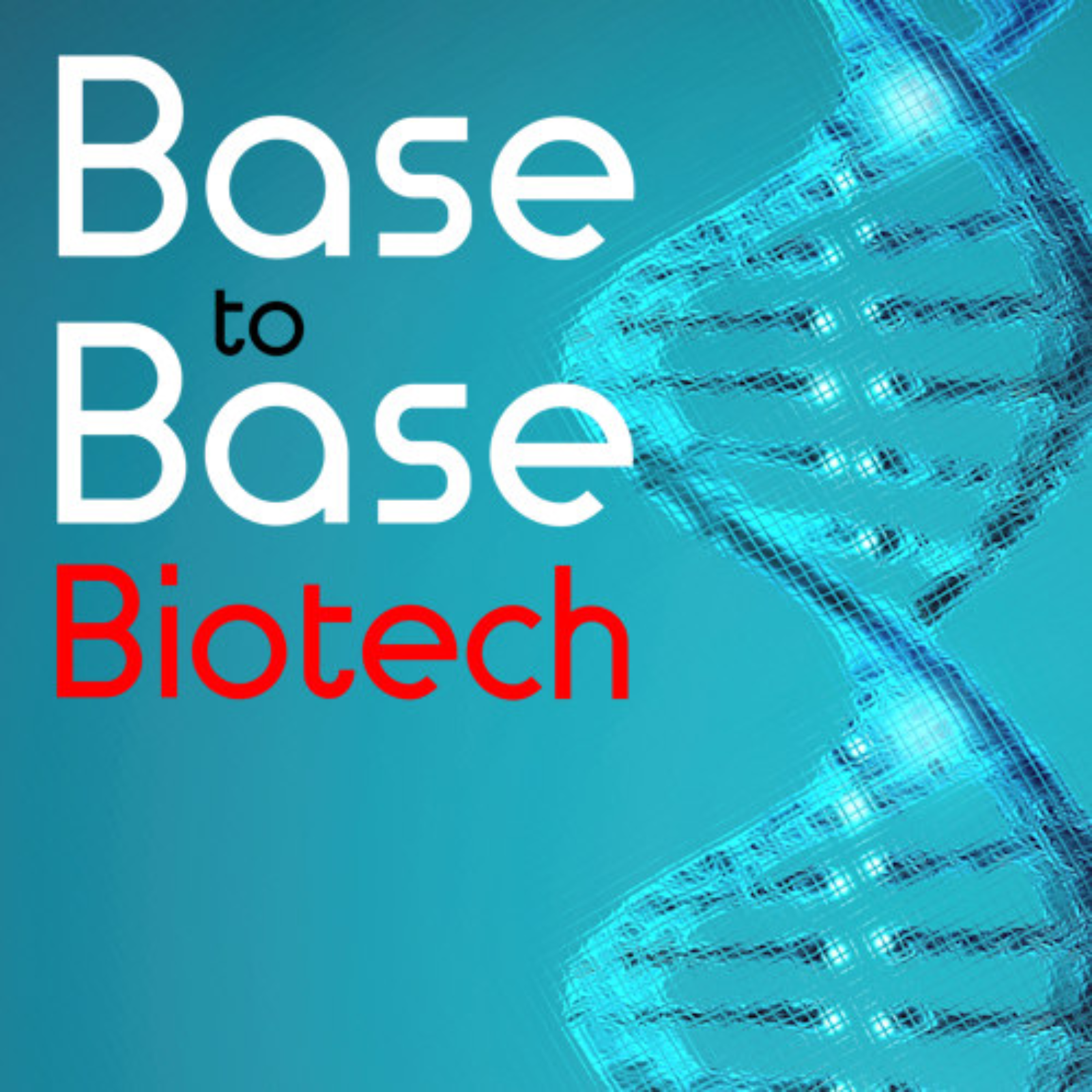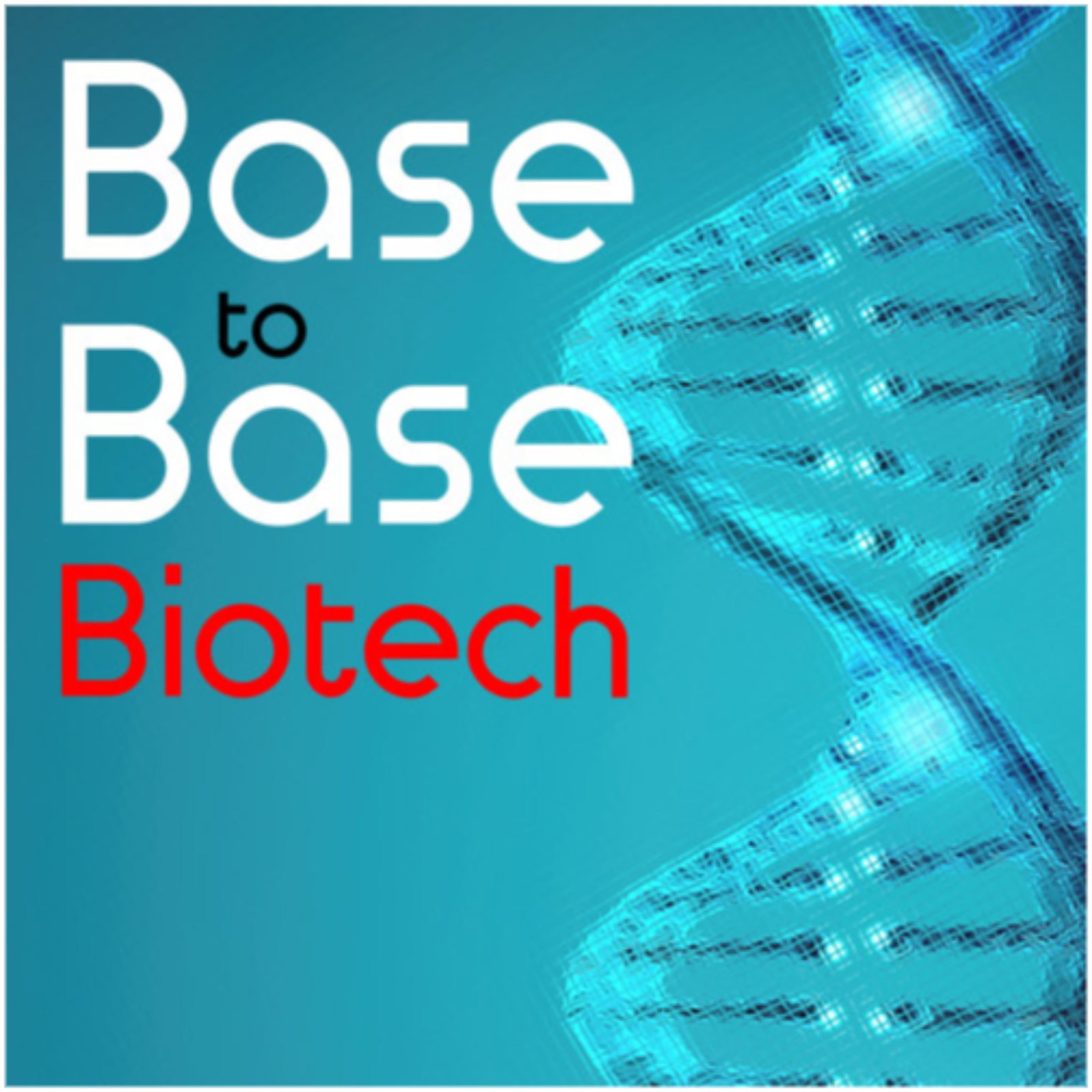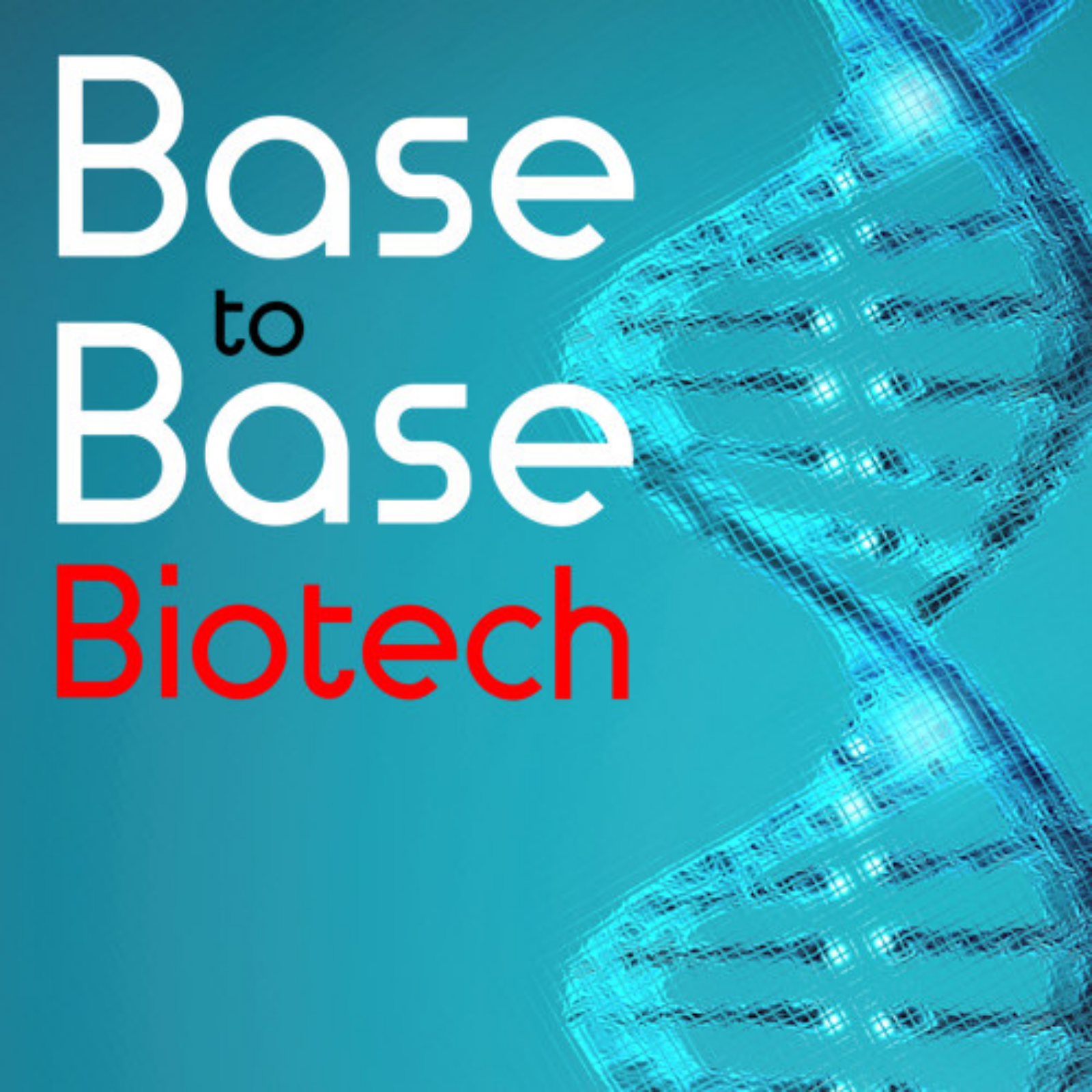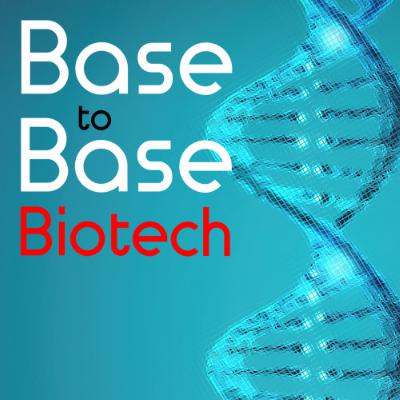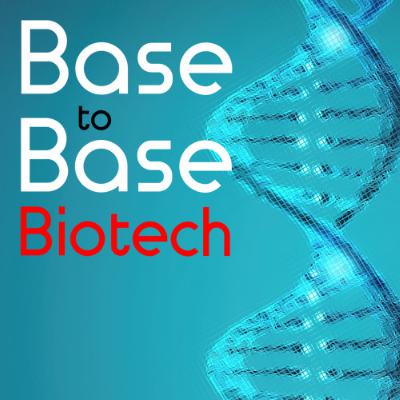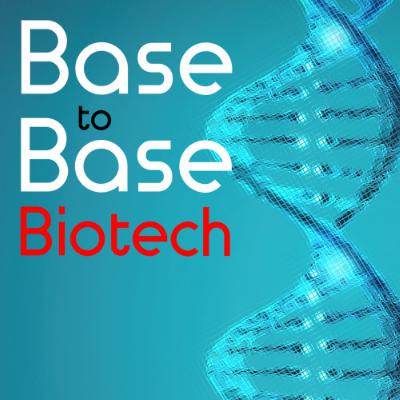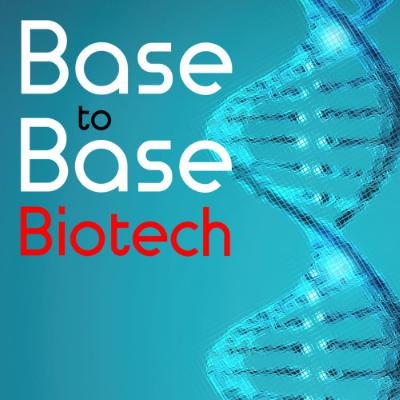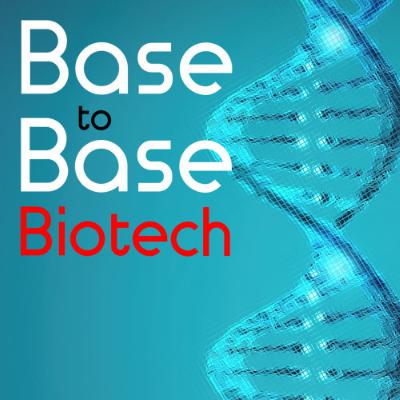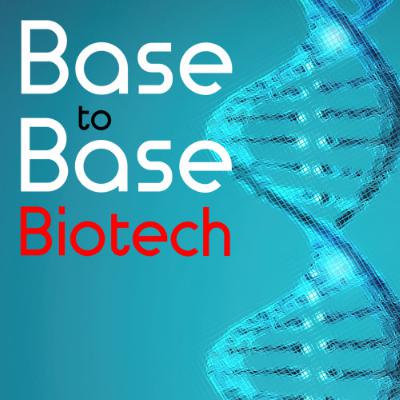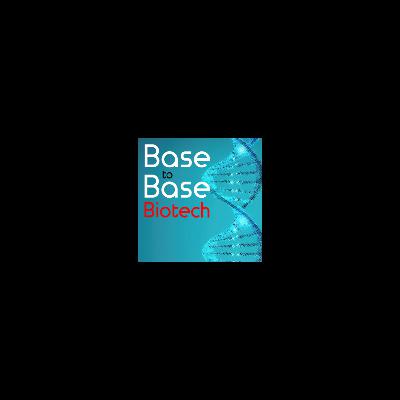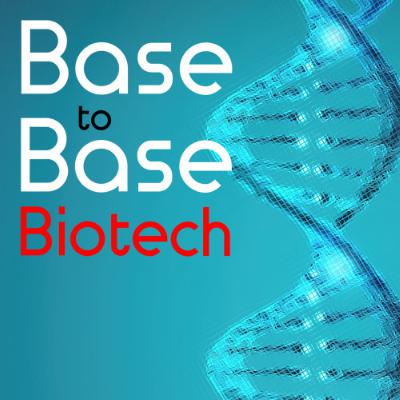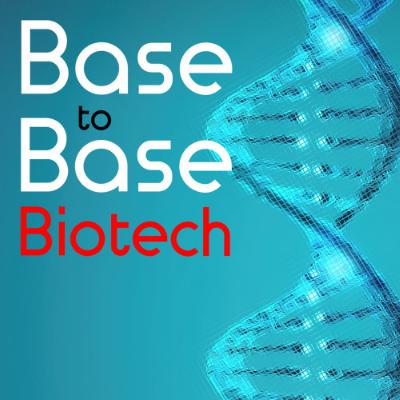Discover Base to Base Biotech
Base to Base Biotech

Base to Base Biotech
Author: Jim Cornall
Subscribed: 6Played: 23Subscribe
Share
© Ayr Coastal Media Ltd 2025
Description
The Base to Base Biotech podcast is a weekly look at what's happening in the world of biotech, with interviews with biotech leaders around the world.
Whether it's a new drug, cutting-edge technology, product launches, new technology, major finding announcement or clinical trial results, Base to Base Biotech keeps you informed.
The podcast is hosted by former biotech editor and broadcaster, the award-winning media veteran Jim Cornall.
Base to Base is an Ayr Coastal Media Ltd production.
46 Episodes
Reverse
The conversations on this week’s podcast are with Vibhor Gupta, director and founder of Pangaea Data, and endogene.bio CEO María Teresa Pérez Zaballos.Times:03:09 Pangaea Data23:43 endogene.bioEndogene.bioendogene.bio is a precision medicine company based in France developing a non-invasive diagnostic for endometriosis. The company’s aim is to apply precision medicine to female health.The company was formed in 2022 by Maria Teresa Perez Zaballos and Cristina Fernandez Molina. Its innovations include a non-invasive diagnostic approach that uses menstrual blood rather than traditional blood draws or invasive surgery. By focusing on the uterine environment directly, the company aims to replace the current "gold standard" of laparoscopic surgery with a high-signal "liquid biopsy" that can be collected at home.The company recently published a preprint, “Beyond one-size-fits-all: single-cell transcriptomic signatures predict drug efficacy and reveal responder subgroups in endometriosis.”The company’s most recent scientific output, it was published in January 2026, and shows how the company uses single-cell transcriptomic signatures to map the molecular heterogeneity of the disease. The research has identified distinct "responder subgroups," suggesting that endometriosis is not a single condition but a collection of cellular programmes that dictate how a patient will react to specific therapies. This primary data positions endogene.bio’s platform as both a diagnostic tool and a predictive framework for patient stratification in clinical trials, aiming to move the field toward personalized treatment selection.Pangaea DataPangaea Data provides a clinical-grade AI platform, PALLUX, designed to identify untreated, misdiagnosed, and under-treated patients by extracting intelligence from unstructured records.The platform emulates clinical reasoning to scan doctors’ notes and pathology reports, identifying care gaps across conditions such as oncology, rare diseases, and chronic kidney disease. It operates behind the healthcare organisation's firewall to ensure data privacy while integrating directly into existing EHR workflows and ambient listening tools.The platform's "Privacy by Design" architecture allows it to scale across multiple disease areas without the need for manual data labelling. By mapping clinical features and disease trajectories, PALLUX provides clinicians with a single dashboard to access actionable insights. The methodology is currently deployed across 13 countries, helping pharmaceutical companies and healthcare providers discover up to five times more patients who would otherwise be missed by conventional search methods.In December 2025, the London-headquartered company announced a multi-year strategic collaboration with AstraZeneca to advance precision healthcare through multimodal AI. The collaboration focuses on co-developing an enterprise-grade platform that fuses clinical, imaging, and genomic data to improve real-time treatment recommendations and speed up clinical trial recruitment.To get in touch with guest suggestions, or to sponsor or advertise on the podcast, please email jim@deeptechdigest.com
This week, we chat with Affibody CEO David Bejker, and Martin Gleave, founder and chief medical officer at Sustained Therapeutics.Times:03:47 Affibody23:28 Sustained TherapeuticsSustained TherapeuticsA spin-out from the University of British Columbia in Canada, Sustained Therapeutics utilises a proprietary polymer gel technology to develop locally injected, long-acting medications. The platform is designed to release active pharmaceutical ingredients in a controlled manner over several weeks, aiming to replace traditional oral delivery or frequent injections.While the primary focus is on managing acute and chronic pain without the use of opioids, the company is also exploring applications for the technology in inflammatory diseases and urology.The core of the company’s pipeline involves a non-addictive, sustained-release formulation that targets the site of pain directly. By providing localized treatment, the technology seeks to minimize systemic side effects and reduce the patient's reliance on addictive substances. Beyond pain management, the firm is adapting its delivery system for oncological use, specifically targeting upper tract urothelial carcinoma, where localized, prolonged drug exposure is clinically advantageous.In January 2026, the company reported positive data from its phase II clinical trial for a long-acting non-opioid medication designed for chronic pain. The results indicated that the sustained-release mechanism effectively extended pain relief while maintaining a favourable safety profile. These findings support the continued expansion of their clinical program into other chronic pain indications, including pelvic and scrotal pain, which are slated for further study throughout the year.AffibodyAffibody, a Swedish clinical-stage biopharmaceutical firm, is developing a new class of small proteins known as Affibody molecules. These engineered proteins are significantly smaller than traditional monoclonal antibodies—roughly one-tenth the size—which allows for better tissue penetration and flexible formatting for multi-specific treatments. The company’s research spans two main pillars: immunology and radiopharmaceuticals, leveraging its library of more than 10bn unique protein sequences to identify highly specific binders for various disease targets.Recent activity has centred on a significant financial and clinical milestone. In late January 2026, the company launched a $29m rights issue, fully guaranteed by its lead shareholder, to fund its expanding radiopharmaceutical pipeline. This capital injection follows successful early-stage data for its RLT candidate, ABY-271; a Trial Review Committee recently recommended advancing the candidate to the second part of a phase I study in HER2-positive metastatic breast cancer after initial patient cohorts showed promising safety and biodistribution.To get in touch with guest suggestions, or to sponsor or advertise on the podcast, please email jim@deeptechdigest.com
This week, we chat with Pan Cancer T CEO Dr. Rachel Abbott, about – among other things – triple-negative breast cancer. We also have a conversation with Erik Manting, CEO of immunotherapy company Mendus, and Janet Hoogstraate, CEO of the CDMO helping them, North X Biologics.Times:03:56 Pan Cancer T20:23 Mendus/NorthX BiologicsMendusMendus is a Swedish–Dutch immuno-oncology company developing cell-based therapies aimed at stopping cancers from coming back rather than treating only the initial tumour. Its lead product, vididencel, is an off‑the‑shelf dendritic cell vaccine being developed as a post‑remission therapy for patients with acute myeloid leukaemia (AML), and more recently chronic myeloid leukaemia, who remain at high risk of relapse after standard treatment. Mendus’ pipeline explores how active immunotherapies could extend treatment‑free survival in different myeloid malignancies.In 2025, Mendus refined its strategy for vididencel on the back of positive data from a phase 2a trial in high‑risk AML, where long‑term follow‑up has shown durable remissions and an encouraging safety profile. Vididencel is also being studied in a phase 2b trial in combination with oral azacitidine, aimed at broadening its use beyond patients with measurable residual disease.NorthX BiologicsNorth X Biologics is a contract development and manufacturing organisation (CDMO) and national innovation hub for complex biologics in Sweden. The company provides GMP‑grade development and manufacturing services for plasmid DNA, recombinant proteins, viral vectors, and cell & gene therapies from its facilities in Matfors and on the Karolinska University Hospital campus in Stockholm. Its goal is to give emerging biotechs and academic groups access to infrastructure and regulatory expertise that would be hard to build alone.NorthX has expanded into cell therapy manufacturing, adding capabilities for multiple cell types, including pluripotent stem cells. The organisation aims to strengthen Sweden’s role as a European centre for advanced therapy medicinal products (ATMPs).NorthX has collaborated with Mendus since 2023. In late 2025, they announced successful GMP manufacturing certification for vididencel at NorthX’s facilities, which supports Mendus’ upcoming late‑stage clinical trials and eventual commercial supply.Pan Cancer TPan Cancer T brings a different angle to cancer immunotherapy, focusing on engineered T cell receptor (TCR‑T) therapies for hard‑to‑treat solid tumours.Based in Rotterdam and spun out from Erasmus MC in 2020, the company is building a pipeline around tumour‑specific antigens that are consistently and strongly expressed across multiple cancers. Its lead programme, PCT1:CO‑STIM, is being developed for women with triple‑negative breast cancer, an aggressive form of the disease with limited treatment options and poor survival once it has spread.By focusing on shared antigens across different tumour types, Pan Cancer T aims to develop treatments that could, in time, be applied beyond breast cancer to other solid tumours including melanoma and cancers of the skin, colorectum, stomach, oesophagus, ovary and uterus.In December 2025, the company announced €10m financing to move PCT1:CO‑STIM into its first‑in‑human clinical trial in the Netherlands.To get in touch with guest suggestions, or to advertise on the podcast, contactjim@deeptechdigest.com
This week, we have a conversation with Lisa Guerrettaz, executive director, Pharmacology and Translational Science at Artiva Biotherapeutics; and Avacta Therapeutics’ CEO Christina Coughlin.Times:04:12 Artiva Biotherapeutics21:30 Avacta TherapeuticsArtiva BiotherapeuticsArtiva Biotherapeutics is a clinical‑stage cell therapy company developing off‑the‑shelf (allogeneic) natural killer (NK) cell therapies for autoimmune diseases and cancer. Headquartered in San Diego and founded in 2019, the company was created as a spin‑out from GC Cell (formerly GC Lab Cell) in South Korea, alongside a strategic partnership granting Artiva exclusive rights (outside Asia, Australia and New Zealand) to GC Cell’s NK manufacturing technology and associated programmes.Artiva’s lead programme is AlloNK, a non‑genetically modified, cryopreserved NK cell therapy designed to enhance antibody‑dependent cellular cytotoxicity (ADCC) when paired with monoclonal antibodies. The company positions this approach to achieve deep B‑cell depletion in outpatient settings without the complexity and cost associated with bespoke autologous cell therapies.In terms of clinical activity, AlloNK is being evaluated across three ongoing trials in B‑cell‑driven autoimmune diseases, including company‑sponsored and investigator‑initiated basket studies covering indications such as rheumatoid arthritis, systemic lupus erythematosus, lupus nephritis and Sjögren’s disease. Artiva has treated more than 100 patients with AlloNK across oncology and autoimmune disease and is planning FDA interactions in the first half of 2026 aimed at enabling a pivotal trial pathway in rheumatoid arthritis.Avacta TherapeuticsAvacta is a life sciences company best known for its Affimer platform—engineered binding proteins positioned as an alternative to antibodies for use in diagnostics, reagents and therapeutics. The company’s activities span both life science reagents/diagnostics and oncology therapeutics, with the latter centred on its pre|CISION technology, which is designed to activate drugs selectively in the tumour microenvironment. In therapeutics, Avacta’s most advanced programme is faridoxorubicin (AVA6000), which uses a fibroblast activation protein (FAP)‑targeted mechanism intended to release an active form of doxorubicin preferentially at tumour sites. The programme has moved into phase 1b expansion cohorts to assess efficacy in more homogeneous patient populations and help guide expectations for later‑stage studies.Earlier this month, the company announced U.S. Food and Drug Administration (FDA) clearance of the Investigational New Drug (IND) application for its FAP-Exd programme, the first pre|CISION peptide drug conjugate based on the highly potent topoisomerase I inhibitor, exatecan.To get in touch with guest suggestions, or to sponsor or advertise on the podcast, please email jim@deeptechdigest.com
This week, three interviews, and five guests. We have conversations with Ulrik Tirsted Zeuthen, CEO, and Katarina Cantell, founder/CSO of Adalyon; Nisit Khandelwal, co-founder/CEO, Cycuria Therapeutics; and Craig Ritchie, founder/CEO of Scottish Brain Sciences and Deborah O’Neil, CEO/CSO of NovaBiotics as well as chair of the Life Sciences board of Opportunity Northeast, which runs ONE BioHub, and BioAberdeen.Times:02:38 Adalyon32:44 Cycuria Therapeutics53:43 Scottish Brain Sciences/One BioHubCycuria TherapeuticsCycuria Therapeutics is a preclinical oncology company based in Graz, Austria, which is developing first‑in‑class protein therapeutics for hard‑to‑treat blood cancers. Its lead programme, CUR‑101, is designed to target both acute myeloid leukaemia (AML) tumour cells and the tumour stem cells thought to drive relapse, while sparing healthy blood formation.The company combines cytokine biology with protein engineering to deliver durable efficacy alongside a better safety profile in preclinical models.Cycuria recently announced significant public grant funding to support the translation of CUR‑101 and follow‑on assets into the clinic.Scottish Brain SciencesScottish Brain Sciences runs brain health research centres that specialise in clinical trials for early detection and treatment of neurodegenerative disease, with a particular focus on Alzheimer’s.Scottish Brain Sciences is building one of the world’s largest biobanks of genetic, blood and imaging data in neurodegenerative conditions. It has helped more than 100 people with Alzheimer’s enrol into drug trials, and is leading the IONA longitudinal cohort study to characterise very early disease changes and prevent progression to dementia.The company recently opened a new office at ONE BioHub in Aberdeen.One BioHubONE BioHub is a £40m life sciences innovation hub on Aberdeen’s Foresterhill Health Campus, created for high‑growth life science ventures in the north‑east of Scotland. The facility brings together start‑ups, spin‑outs and scaling companies with flexible labs, offices and grow‑on space, alongside commercialisation and skills programmes.Led and co‑funded by Opportunity North East with support from the UK and Scottish governments, Scottish Enterprise and regional partners, ONE BioHub can accommodate up to 400 bio‑entrepreneurs. The aim is to accelerate research from the University of Aberdeen, Robert Gordon University and NHS Grampian into market‑ready solutions, diversifying the regional economy and creating life sciences jobs.AdalyonAdalyon develops AI‑driven speech biomarkers to serve as digital endpoints in clinical trials, helping sponsors detect treatment response earlier and manage patient engagement. Its platform analyses natural speech from voice journalling or guided conversations to extract behavioural, emotional and paralinguistic features relevant to psychiatric and neurological conditions.The company combines AI engineering, clinical research operations and behavioural science to build tools that align with regulatory expectations for digital endpoints. Its technology is designed to automate aspects of psychometric assessment, flag dropout risk and shorten trial timelines by enabling earlier, objective insight into how patients are responding to therapy.To get in touch, please email jim@deeptechdigest.com
This week, we’re talking about eye treatments with Oculis CEO, Riad Sherif, we have a conversation about mitochondria, with the CEO of Vandria, Klaus Dugi, and there’s also a short discussion about GoCo Health Innovation City in Gothenburg, Sweden, with Moa Dicksdotter, Partnership and Ecosystem.Times:02:35 Vandria20:03 GoCo Health Innovation City25:54 OculisLooking to the eyesOculis is a Swiss ophthalmology company developing topical and biologic treatments for retinal disease and neuro‑ophthalmic conditions. Its pipeline spans diabetic macular oedema, dry eye disease, and optic neuropathies, with a focus on non‑invasive delivery formats that can replace or reduce the need for injections. The company’s lead asset, OCS‑01, is in late‑stage development as a topical alternative for diabetic macular oedema.In December, the U.S. FDA granted Breakthrough Therapy Designation to Oculis’ neuroprotective candidate, Privosegtor (OCS‑05), for optic neuritis. The decision followed phase 2 data showing clinically meaningful improvements in low‑contrast visual acuity. The designation allows for closer FDA interaction as the programme moves toward registrational studies.Oculis is now preparing for multiple clinical milestones across 2026, including pivotal readouts for OCS‑01. The company continues to position itself around differentiated delivery technologies in ophthalmology, with programmes spanning both front‑ and back‑of‑the‑eye disorders.Mitochondrial therapeuticsVandria is a Lausanne‑based biotech developing small‑molecule mitophagy activators aimed at restoring mitochondrial quality control in age‑related and chronic diseases. Its approach centres on orally available compounds designed to improve cellular resilience in neurological and muscular disorders. The company’s lead programme, VNA‑318, is being advanced for neurodegenerative indications.In November 2025, Vandria released phase 1 results for VNA‑318, reporting that the study met its safety and pharmacokinetic objectives and showed biomarker evidence of target engagement. The data support progression into phase 2 development for Alzheimer’s disease, with trial planning now under way.The company is also preparing for its next financing round to support clinical expansion and further development of its mitochondrial therapeutics platform.GoCo Health Innovation CityGoCo Health Innovation City is a life‑science district in Mölndal, south of Gothenburg, Sweden, designed as a mixed ecosystem for research, industry, and healthcare organisations. The campus brings together established companies, scale‑ups, and academic groups across health, biotech, and medtech, with a focus on co‑located labs, offices, and community‑driven programmes.Recently, the site marked a major milestone with the opening of Mölnlycke Health Care’s new global headquarters on the campus. The inauguration brought renewed attention to GoCo’s role as a strategic hub for Swedish life‑science activity and its ability to attract multinational tenants.The district is continuing to expand its research infrastructure. Thermo Fisher Scientific is establishing a new bioanalytical laboratory on the campus, scheduled to open in late 2025. The facility will support pharmaceutical and biotech clients with GLP‑compliant services and is expected to add significant analytical capacity to the region.To get in touch with guest suggestions, or to sponsor or advertise on the podcast, please email jim@deeptechdigest.com
This week, we’re talking about skin and wounds, with Ned Swanson, president and chief medical officer at PolarityBio, and Nikolai Sopko, chief operating officer, chief scientific officer and director at PolarityBio; and we discuss anchored immunotherapy with Howard Kaufman, CEO of Ankyra Therapeutics.04:03 Ankyra Therapeutics34:31 PolarityBioAnchored immunotherapiesAnkyra Therapeutics, based in Cambridge, Massachusetts, develops anchored immunotherapies that tether cytokines at the injection site to stimulate local immune responses while limiting systemic toxicity. The company’s technology is designed to unlock cytokines that have historically been limited by safety concerns.Its lead programme, ANK‑101 (tolododekin alfa), is an anchored IL‑12 construct. Early trials have demonstrated safety and local immune activation, and the company is now testing the drug in combination with checkpoint inhibitors for non‑small cell lung cancer. The platform is modular, allowing other immune payloads to be developed using the same anchoring chemistry.Ankyra recently began dosing patients in its phase 1b LANTERN trial, combining ANK‑101 with PD‑1/PD‑L1 inhibitors in non‑small cell lung cancer.The science of skinUtah-headquartered PolarityBio focuses on regenerative skin therapies for chronic wounds. Its flagship product, SkinTE, is an autologous heterogeneous skin construct designed to restore functional skin architecture in Wagner Grade 1 diabetic foot ulcers.The company’s development strategy centres on pivotal trials to demonstrate healing rates, durability, and safety, with regulatory and reimbursement pathways treated as critical for adoption. SkinTE has Breakthrough Therapy designation from the FDA.PolarityBio recently announced completion of its pivotal phase III trial, with final results expected in early 2026.To get in touch with guest suggestions, or to sponsor or advertise on the podcast, please email jim@deeptechdigest.com
This week, we have conversations with Jakob Andersson, vice president of engineering at Anaphora and founder and chairman of GAIA; Coave Therapeutics’ CEO Rodolphe Clerval; and MOBILion Systems’ CEO, Melissa Sherman.Times:03:13 Coave Therapeutics 24:43 GAIA Conference 36:55 MOBILion SystemsGenetic medicine for ophthalmologyCoave Therapeutics is a Paris‑based biotechnology company focused on developing genetic medicines using its ALIGATER platform. The company has pioneered ligand‑conjugated AAV vectors, enabling precision capsids that are highly tissue‑specific, safer, and more effective.In October 2025, Coave presented data at the European Society of Gene and Cell Therapy Congress in Seville, demonstrating the superiority of its lead suprachoroidal capsid, coAAV‑SCS‑01. The vector showed up to 26‑fold improved performance in targeting retinal cells compared to other capsids. This work supports the company’s focus on treatments for retinal vascular diseases.Coave also recently announced the nomination of its lead gene therapy programme, CoTx‑101, for conditions such as wet age‑related macular degeneration and diabetic macular oedema. Delivered via an in‑office suprachoroidal procedure, CoTx‑101 aims to provide durable vision gains.Artificial intelligence and the GAIA ConferenceJakob Andersson is the vice president of engineering at Swedish company Anaphora, a company active in artificial intelligence and complex systems.He is also the founder and chairman of the Gothenburg Artificial Intelligence Alliance (GAIA), a non‑profit association established in 2018 to promote interest in AI, machine learning, and data science in the Gothenburg region. GAIA hosts the annual GAIA Conference, which has become a recognised event for researchers, developers, and industry leaders to share advances in artificial intelligence.At the 2025 GAIA Conference, Andersson delivered the opening remarks, outlining the state of AI and expectations for the future. The conference continues to attract international participation, with sessions ranging from lightning talks to open discussions shaped by attendees.Separation scienceMOBILion Systems is a US‑based company specialising in separation science and advanced proteomics technologies. Its proprietary platforms, including MOBIE and BILLIE, are designed to improve ion mobility and mass spectrometry workflows, enabling deeper proteome coverage and faster analysis.The company has gained recognition for its innovations in parallel accumulation mobility aligned fragmentation (PAMAF), a technique that enhances sensitivity and throughput in proteomics and multi‑omics research.In November 2025, MOBILion presented transformative advances in proteomics at the HUPO World Congress in Toronto. Its CTO, Daniel DeBord, highlighted how PAMAF technology delivers near‑complete ion utilisation, improving analysis of post‑translational modifications and proteoforms.To get in touch with guest suggestions, or to sponsor or advertise on the podcast, please email jim@deeptechdigest.com
This week, we have conversations with Sjanna Bosma, international relations officer at Health Holland; Mark Bagnall, CEO of Phenomix; and PDS Biotechnology CEO Frank Bedu-Addo.04:17 Phenomix 32:53 Health Holland 44:02 PDS BiotechnologyPhenomix takes on obesityPhenomix Sciences is a biotechnology company focused on precision obesity medicine. The firm has developed the MyPhenome test, a saliva‑based assay that uses machine‑learning algorithms and genetic risk scores to classify obesity phenotypes and predict treatment outcomes.The company positions itself as the first commercial precision obesity medicine biotech, aiming to improve patient stratification and guide therapeutic decisions for obesity management. Its work is closely tied to the Mayo Clinic, where co‑founder Andres Acosta has led much of the underlying research.Recent studies have expanded the evidence base for MyPhenome, particularly in relation to GLP‑1 receptor agonists such as semaglutide and liraglutide. At Obesity Week 2025, Phenomix presented data showing the test’s ability to predict weight‑loss response across diverse patient populations, including those who had undergone bariatric surgery.PDS Biotechnology harnesses immune system to kill cancer cellsPDS Biotechnology is a late‑stage immunotherapy company in New Jersey. It develops novel treatments that harness the immune system to target and kill cancer cells, with its lead candidate PDS0101 designed for HPV16‑positive cancers.The company’s pipeline is based on its Versamune platform, which is intended to activate both CD4+ helper and CD8+ killer T cells to generate durable anti‑tumour responses. PDS Biotech has advanced multiple clinical programmes, with head and neck cancer as a primary focus.PDS0101 could become a new immunotherapy option for patients with HPV‑related cancers, addressing a significant unmet medical need.The Netherlands life sciences industryThe Dutch life sciences industry was represented at the Nordic Life Science Days in Gothenburg. Health Holland, the public‑private partnership that promotes the Dutch life sciences and health sector, coordinated the Dutch Lounge at the event.This brought together biotech, medtech, and contract research organizations from the Netherlands, highlighting the country’s strengths in innovation, collaboration, and international partnerships.The Netherlands has established itself as a hub for advanced therapies, biopharma, and medical technologies. At NLS Days, more than 30 Dutch companies emphasised their expertise in areas such as cell and gene therapy, diagnostics, and digital health. The event provided opportunities to showcase collaborations with Scandinavian partners and explore new avenues into the Nordic market.The Netherlands continues to develop international cooperation and attract investment into the life sciences sector and continues to position itself as a leading European life sciences hub, leveraging events like NLS Days to build visibility and connect with key stakeholders across the region.To get in touch with guest suggestions, or to sponsor or advertise on the podcast, please email jim@deeptechdigest.com
This week, we have conversations with Jérôme Van Biervliet, chair of the board of Flanders life sciences body Biovia and managing director at VIB; Sylvain Sachot, partner at Asabys Partners; and Jonas Béal, head of science strategy, R&D, at Owkin.03:32 Owkin 27:42 Biovia/VIB 38:06 Asabys PartnersBiovia/VIBBiovia has emerged as a new health innovation cluster in the Belgian region of Flanders, created through the merger of flanders.bio and MEDVIA.The organisation brings together more than 450 members across biotech, medtech, and digital health, with a focus on unmet medical needs and value‑based healthcare. It positions itself as a spearhead cluster supported by Flanders Innovation & Entrepreneurship (VLAIO).In July 2025, Biovia launched its second funding call of the year, offering €8m in non‑dilutive support for consortia projects.Biovia’s broader vision is framed around “One Health,” emphasizing the interdependence of human and planetary health. This approach is intended to break down silos between sectors and align with EU priorities for sustainable healthcare innovation.VIB (Vlaams Instituut voor Biotechnologie) is a research institute founded by the Flemish government in 1995. Its main objective is to strengthen Flemish life sciences research and to turn the results into new economic growth.Asabys PartnersAsabys Partners is a Barcelona‑based venture capital firm specialising in healthcare investments. The firm manages funds focused on biotech, medtech, and digital health, and has steadily expanded its portfolio through both direct investments and strategic partnerships.In September 2025, Asabys led a €10m extension of SafeHeal’s oversubscribed Series C financing round. The funding is intended to accelerate commercialization of Colovac, a medical device designed as an alternative to temporary stoma in colorectal cancer surgery.In early October, Asabys integrated Aliath Bioventures into its platform, boosting assets under management from €300m to more than €400m. The integration strengthens its position in European life sciences investment and sets a trajectory toward building a €1bn platform by 2030.OwkinOwkin is a French‑based biotech company focused on applying artificial intelligence to clinical research and drug development.Founded in 2016, it has built a platform that combines machine learning with multi‑modal biomedical data, aiming to accelerate discovery and improve trial efficiency. Its work spans oncology, cardiovascular disease, and immunology, with a focus on predictive modelling and biomarker identification.The company’s core product, Owkin K, functions as an AI copilot for biology. It is designed to integrate genomic, imaging, and clinical data to help researchers uncover mechanisms of disease and optimize trial design. By embedding AI into the research process, Owkin positions itself as a bridge between raw health data and actionable therapeutic insights.Owkin has established partnerships with major pharmaceutical companies including Bristol Myers Squibb, Sanofi, and Merck, as well as collaborations with European cancer centres and teaching hospitals.To get in touch with guest suggestions, or to sponsor or advertise on the podcast, please email jim@deeptechdigest.com
This week, we have conversations with Robert Bunn, founder and president of Ultrasound AI; Laura MacNeill, CEO of the Charcot Marie Tooth Research Foundation; and Iris Örhn, investment advisor at Business Region Göteborg.03:00 Ultrasound AI 30:19 Business Region Gothenburg 39:35 CMTRFBusiness Region GothenburgBusiness Region Gothenburg (BRG) is the regional development agency for western Sweden, tasked with driving growth and innovation across key sectors, including life sciences. Its work spans business support, investment promotion, and cluster development.Gothenburg has more than 600 life science companies with around 11,000 employees, creating a strong ecosystem for biotech, medtech, and pharma. This is reinforced by BRG’s efforts to attract global investors.The recent NLS Days event, held in Gothenburg for the first time, highlighted the city’s growing influence. It featured the launch of SwedenBIO’s updated pipeline report, which tracks more than 500 active drug development projects across the country. BRG focuses on infrastructure and innovation platforms such as GoCo Health Innovation City, aiming to strengthen the city’s role in precision medicine, digital health, and advanced therapies. These efforts reflect a long-term strategy to ensure the region remains globally competitive in life sciences.Ultrasound AIUltrasound AI is a US technology company specialising in artificial intelligence solutions for ultrasound diagnostics, with a focus on improving accuracy in pregnancy-related diagnostics. Its technology is designed to predict gestational age and identify risks such as preterm birth with precision, reducing uncertainty in care for premature babies.By analysing image data alone, the platform aims to support clinicians in making faster, more reliable decisions at the point of care.Ultrasound AI recently expanded its portfolio, securing additional patents that cover predictive algorithms for obstetric and cardiovascular applications.These developments build on earlier work in gestational age estimation and preterm birth prediction, areas where AI-driven tools are gaining traction in clinical practice. The company’s technology integrates into existing ultrasound systems, making adoption practical for hospitals and clinics.As demand for point-of-care diagnostics rises, Ultrasound AI’s approach reflects a broader shift toward data-driven healthcare.Charcot-Marie-Tooth Research Foundation (CMTRF)The Charcot-Marie-Tooth Research Foundation (CMTRF) is a non-profit organisation dedicated to accelerating the development of treatments for Charcot-Marie-Tooth disease, a group of inherited neuropathies affecting peripheral nerves.CMTRF focuses on funding research that moves promising therapies from the laboratory into clinical trials, bridging the gap between discovery and delivery.It has recently advanced several projects aimed at addressing different genetic subtypes of CMT. These include preclinical studies on gene therapy and small-molecule approaches, as well as partnerships with biotech firms to support early-stage drug development.The foundation prioritises collaboration with academic researchers and industry partners to maximise impact and shorten timelines for therapeutic breakthroughs.To get in touch with guest suggestions, or to sponsor or advertise on the podcast, please email jim@deeptechdigest.com
This week, we have conversations with Malin Kjällström, Gothenburg Tech Week Press and partnerships lead; Eliot Forster the CEO of Levicept; and Christophe Demaison, CEO of ENA Respiratory.Gothenburg Tech WeekGothenburg Tech Week is western Sweden’s largest technology event, held annually across multiple venues in the city. The 2025 edition ran from October 14–16, with a programme that includes startup and investor matchmaking, thematic forums, and partner showcases.The event covers a wide range of topics, including AI, life sciences, and sustainable technologies. Sessions are hosted at The Yard, World of Volvo, and other partner locations, with activities designed to connect regional innovation with international networks.Gothenburg Tech Week has established itself as a meeting place for entrepreneurs, investors, and innovators in Northern Europe. The event provides a platform for new ideas, collaborations, and opportunities, reinforcing Gothenburg’s role as a hub for technology and innovation.LeviceptLevicept is a biotechnology company based in Sandwich in the UK.It is developing LEVI‑04, a therapy for osteoarthritis and the associated pain that targets the neurotrophin‑3 pathway. The programme is intended as a non‑opioid alternative for chronic pain management. The company originated from research at Pfizer’s former R&D site in Kent, where founder Simon Westbrook spun out the programme to continue development independently.In June 2025, Levicept presented new data from its large‑scale phase II trial at the European Congress of Rheumatology (EULAR) in Barcelona. The study enrolled more than 500 patients with knee osteoarthritis and demonstrated clinically meaningful improvements in pain and function.Levicept is advancing preparations for late‑stage clinical trials.ENA RespiratoryENA Respiratory is a clinical‑stage pharmaceutical company headquartered in Melbourne, Australia. It develops antiviral host defence enhancers for the prevention of complications from respiratory viral infections. Its lead product, INNA‑051, is a nasal spray designed for weekly self‑administration.INNA‑051 works by priming innate immune responses at the entry site of respiratory viruses in the upper airways. This mechanism accelerates viral clearance and reduces dissemination to the lungs. The product is being evaluated in clinical studies for safety and efficacy.Last month, ENA Respiratory raised $34m in a Series B funding round to support the development of INNA‑051.To get in touch with guest suggestions, or to sponsor or advertise on the podcast, please email jim@deeptechdigest.com
It’s World Immunization Day on Monday, so we had a chat with Geovax chairman, president and CEO David Dodd, and in our other conversation, we talked about infertility, with Igyxos Biotherapeutics’ chief medical officer Elke Bestel.Challenging infertilityIgyxos Biotherapeutics is a French biotechnology company founded in 2017 and based in Nouzilly, France. The company focuses exclusively on infertility, developing monoclonal antibody‑based therapeutics designed to enhance the activity of gonadotropins, the hormones central to reproduction.Its lead program involves a first‑in‑class antibody that potentiates follicle stimulating hormone (FSH), aiming to improve the effectiveness of fertility treatments for both men and women. Igyxos brings together a small team of scientific experts and has raised venture capital to support its research.The company’s approach is intended to overcome limitations of current infertility treatments, which often have modest success rates. By targeting hormonal pathways directly, Igyxos aims to deliver more reliable outcomes for patients.In October 2025, Igyxos announced it had secured a €5.7m grant from the French government under the France 2030 program. The non‑dilutive funding will support phase 2 clinical trials of its lead antibody, IGX12, across France and Europe.World Immunization DayWorld Immunization Day is observed annually on November 10 to raise awareness of the importance of vaccines in preventing disease and protecting public health. The day emphasizes that immunization is one of the most effective and cost‑efficient health interventions, preventing millions of deaths each year.The observance highlights both the successes of global vaccination campaigns and the challenges that remain, including plateaued coverage rates and disruptions caused by the covid‑19 pandemic. It underscores the role of vaccines in combating infectious diseases, reducing antibiotic resistance, and strengthening community health worldwide.GeoVax Labs, Inc. is a US‑based, clinical‑stage biotechnology company founded in 2001 and headquartered in Atlanta, Georgia. The company develops vaccines and immunotherapies for infectious diseases and cancers, using proprietary Modified Vaccinia Ankara (MVA) vector technology to generate virus‑like particles in vivo.GeoVax’s pipeline includes candidates for covid‑19, Mpox, Ebola, Zika, malaria, and haemorrhagic fever viruses, as well as immunotherapies for solid tumours. Its lead clinical programme, GEO‑CM04S1, is a next‑generation covid‑19 vaccine designed to provide broader and more durable protection, particularly for immunocompromised patients.In late October 2025, GeoVax highlighted phase 2 clinical data for GEO‑CM04S1, showing robust T‑cell responses and cross‑variant durability. The company linked these findings to new Infectious Diseases Society of America (IDSA) guidance emphasising the need for tailored vaccines for immunocompromised populations.To get in touch with guest suggestions, or to sponsor or advertise on the podcast, please email jim@deeptechdigest.com
This week, we have conversations with Cosmo Feilding Mellen, CEO of Beckley Psytech; Sirli Rosenvald, CEO of Estonian company Funki, and Per von Mentzer, CEO of Swedish company PharmNovo. We spoke with Funki at Life Sciences Baltics in Vilnius, Lithuania, recently, and with von Mentzer at NLS Days in Gothenburg.Taking on painPharmNovo AB is a biotechnology company headquartered at Medicon Village in Lund, Sweden. Founded in 2008, it specialises in the development of novel treatments for neuropathic pain, a condition that affects millions of patients worldwide and remains difficult to manage.The company’s lead candidate, PN6047, is a selective delta opioid receptor agonist. Preclinical studies have indicated analgesic effects without the tolerance and dependency risks associated with traditional opioids. PN6047 has progressed into Phase II clinical trials, marking a significant step in evaluating its safety and efficacy in patients.PharmNovo conducts its clinical programme across European trial sites, with a focus on peripheral neuropathic pain indications such as diabetic neuropathy and post‑surgical nerve injury. Data from these studies will inform the design of later‑stage trials and determine the potential pathway toward regulatory approval.Funki fungiFunki is an Estonian food biotech company developing fungi‑based proteins as alternatives to meat and fish. The company combines food science with product development to create sustainable foods that replicate the taste and texture of conventional protein sources.Its work gained international recognition as a finalist in the XPrize “Feed the Next Billion” competition, where it presented a salmon analogue made from pea protein and fungi. This project highlighted both technical capability and consumer‑oriented design.Funki’s research and production efforts are part of a wider European movement to diversify protein supply chains and reduce the environmental impact of food systems.Psychedelics take a leap forwardBeckley Psytech is a UK‑based biotechnology company developing psychedelic‑derived medicines for serious mental health conditions. Its lead programme, BPL‑003, is an intranasal formulation of 5‑MeO‑DMT designed for the treatment of treatment‑resistant depression (TRD). The company is also advancing ELE‑101, an intravenous psilocin candidate, for major depressive disorder and alcohol use disorder.Clinical progress has been significant. Phase IIb trials of BPL‑003 met primary and secondary endpoints, showing rapid and durable reductions in depressive symptoms. On the back of these results, the U.S. FDA granted Breakthrough Therapy designation in October 2025, expediting the path toward phase III trials. ELE‑101 is in earlier‑stage studies, with recruitment completed for initial safety and efficacy assessments.By targeting conditions such as TRD — where existing therapies often fail — Beckley Psytech is addressing one of the most urgent gaps in psychiatry. Its strategy combines short‑acting psychedelic compounds with controlled delivery methods, aiming to make treatments both clinically effective and practical within healthcare systems.To get in touch with guest suggestions, or to sponsor or advertise on the podcast, please email jim@deeptechdigest.com
This week, we have conversations on data integration with Lithuanian company Vugene, and we talk protein degradation with Amphista Therapeutics.Multi-omicsVugene is a Lithuanian bioinformatics company focused on multi-omics data integration. Founded in 2021 by CTO Juozas Gordevičius, the company is headquartered in Kaunas.Its core offering is a software platform designed to help researchers make sense of complex biological datasets — including transcriptomics, proteomics, metabolomics, and epigenomics — without requiring deep coding expertise.The platform is a flexible, modular tool for academic and commercial labs that need to process high-throughput data but lack in-house bioinformatics capacity. Rather than offering a fixed pipeline, Vugene provides a semi-automated interface that allows users to upload raw data, select relevant analysis modules, and receive interpretable outputs.The emphasis is on speed, reproducibility, and transparency.Their early traction has come from collaborations with research groups in Europe and North America, particularly in oncology and neurodegeneration. While still early-stage, the company is positioning itself as a pragmatic alternative to both DIY bioinformatics and expensive consultancy models.We had a conversation with Gordevičius and the company’s CEO, Gražina Mykolaitytė.Protein degradationAmphista Therapeutics, based in the UK, recently announced first data from its SMARCA2 degrader programme, marking significant progress in the targeted protein degradation field.Amphista’s Targeted Glues achieved potent, selective degradation of SMARCA2 within four hours, with CNS penetration in vivo, avoiding off-target effects on the closely related SMARCA4 protein, a key challenge in the field.Building on SMARCA2 data, Amphista also unveiled its TEAD oncology programme, introducing a novel mechanism of action via F-Box Protein 22, distinct from cereblon- or VHL-based PROTACs. This marks the company’s second new MOA this year, reinforcing its leadership in the TPD space and expanding on the BRD9 MOA announced in 2024. Amphista has made significant progress across its pipeline.Their chemistry doesn’t depend on known ligase recruitment, which opens up targets that are inaccessible to conventional TPD platforms.This week, our guest is Louise Modis, chief scientific officer of Amphista.To get in touch with guest suggestions, or to sponsor or advertise on the podcast, please email jim@deeptechdigest.com
This week, we have one interview, covering enzymes and AI with Biomatter Designs, from our visit to Life Sciences Baltics in Vilnius, Lithuania recently. And from the trip to Dublin in Ireland we talked about technology that can be useful in neurological condition diagnosis, and much more, with Danu Sports.Enzymes and AIBiomatter Designs is a Lithuania‑based biotech working at the frontier of protein design. Since its launch in 2018, the company has concentrated on building tools that use artificial intelligence to generate new enzymes and proteins from the ground up.The idea is to move beyond tweaking what nature already provides and instead create molecules with tailor‑made properties for medicine and industry.Its Intelligent Architecture platform is designed to cut through the slow, trial‑and‑error cycles that usually dominate protein engineering. By training generative models on structural and functional data, Biomatter aims to give researchers a way to specify what they need—a catalyst, a therapeutic, a material—and have the system propose viable candidates that can be tested in the lab.We had a conversation with the company’s CEO, Laurynas Karpus.Learning through gaitFounded in 2017, Danu Sports develops wearable technology designed to help athletes train smarter and reduce injuries.The company’s flagship product is a “smart sock” system that uses embedded sensors to capture gait and movement data in real time. Coaches, physiotherapists, and athletes can use the analytics platform to monitor performance, identify risks, and support rehabilitation.Backed by venture funding and based in Dublin, Danu Sports is part of a new wave of sports‑tech companies blending biomechanics, data science, and everyday usability to make high‑level performance insights available outside the lab.In September 2025, the company announced a partnership with Hoka at the Ultra‑Trail du Mont Blanc, showcasing its smart sock technology with elite athletes, while also expanding into medical applications.Our conversation is with Oisín Lennon, CEO of DANU Sports.To get in touch with guest suggestions, or to sponsor or advertise on the podcast, please email jim@deeptechdigest.com
This week, we have three interviews done during Life Sciences Baltics, which was held in Vilnius, Lithuania recently. While we have more still to come, this week on the podcast we have conversations with Justinas Mačiulaitis, Keli Therapeutics’ founder and CEO; Arnas Karužas, CEO of Ligence; and Emilė Radytė, CEO and co-founder of Samphire Neuroscience.LigenceLigence is a health‑tech startup using artificial intelligence to automate echocardiography.Founded in 2019 by a team of medical doctors and engineers, the company’s flagship product, Ligence Heart, applies deep learning to 2D ultrasound images, automatically recognising views and performing cardiac measurements. This reduces the manual workload for clinicians and improves diagnostic consistency in heart disease monitoring.Headquartered in Vilnius, Ligence has raised seed funding from European investors including Simpact VC and the EIC Fund, and is working to expand its AI‑driven cardiac diagnostics platform into hospitals and clinics across Europe.Samphire NeuroscienceSamphire Neuroscience is a femtech and digital health company developing non‑invasive neurotechnology to support women’s health.Founded in 2021, the company’s first product is a wearable headband, Nettle, that uses gentle electrical neuromodulation to alleviate symptoms associated with the menstrual cycle, such as pain, fatigue, and mood changes.With offices in Vilnius and London, Samphire has attracted international venture backing and accelerator support, positioning itself at the intersection of neuroscience, wearables, and women’s health innovation. Its mission is to provide accessible, science‑based tools that improve quality of life for women worldwide.Keli TherapeuticsKeli Therapeutics is advancing next‑generation cell therapies for acute and chronic inflammatory conditions.Its lead candidate, KELI‑101, is designed to prevent acute kidney injury (AKI) following cardiac bypass surgery — a complication that often progresses to chronic kidney disease. In September 2025, Keli announced a strategic manufacturing partnership with Bramble Bio to scale production of KELI‑101, pairing its activated perinatal‑origin mesenchymal stromal cells with Bramble’s cGMP expertise.Earlier this year, the company also secured a €2.5m European Innovation Council grant to launch clinical trials in AKI. With a platform up to 20 times more potent than standard MSCs, Keli is positioning itself as a leader in regenerative medicine with broad potential across inflammatory and degenerative diseases.To get in touch with guest suggestions, or to sponsor or advertise on the podcast, please email jim@deeptechdigest.com
This week, we have two interviews again. We talk about treating high blood pressure with CEO of George Medicines, Mark Mallon, and have a conversation with Jack Hoppin, CEO of Ratio Therapeutics, and John Babich, CSO, about the field of radiotherapeutics.Blood pressureNearly half of US adults have high blood pressure and despite all the treatments already available, three in four remain uncontrolled. This is often because the traditional stepwise treatment approach stalls before reaching target blood pressure.George Medicines believes its solution could help millions of patients achieve better outcomes, faster.The company has developed the first and only triple combination pill for the initial treatment of high blood pressure. It’s available in unique low dose options, offering the power of combination therapy, with good tolerability, in a single pill — a paradigm shift in hypertension care. This drug is the first to be approved for use right at the start of treatment.The company is a spinout from the George Institute for Global Health in Australia.RadiopharmaceuticalsRadiopharmaceuticals sit at the intersection of nuclear medicine and precision therapy, offering a way to deliver radiation directly to tumours while sparing healthy tissue.The next wave of oncology innovation is changing how we think about cancer therapy, but it comes with unique challenges—from isotope supply and manufacturing logistics to regulatory navigation and the race to harness rare isotopes like actinium-225.Jack Hoppin, CEO of Ratio Therapeutics, and John Babich, CSO, are leaders in this space, and they are our guests on the podcast today. Their company is developing next-generation radiopharmaceuticals using proprietary platforms (Trillium and Macropa) designed to enhance tumour targeting and drug design.To get in touch with guest suggestions, or to sponsor or advertise on the podcast, please email jim@deeptechdigest.com
This week, we have two interviews. We chat with Step Pharma CEO, Andy Parker, and also have a conversation with Re-Vana CEO, Michael O’Rourke.Ocular therapeuticsRe-Vana Therapeutics and Boehringer Ingelheim recently announced a $1bn+ deal to develop long-acting ophthalmic therapies.Re-Vana Therapeutics is a privately held, US and UK based developer of ocular therapeutics and innovative ocular drug delivery technologies which spun out of Queens University Belfast, Northern Ireland.Terms of the deal include up to three development programmes per year leading to a potential total deal value exceeding $1bn contingent on milestone achievements. The agreement grants Boehringer Ingelheim target exclusivity, and provide for upfront, development, regulatory and commercial milestone payments to Re-Vana.Re-Vana’s drug delivery technology is designed to release slowly over six to 12 months, aiming to drastically reduce injection frequency.Lowering the treatment burden could lead to higher treatment compliance and potentially result in better therapeutic outcomes.Re-Vana’s is developing internal assets - a six-month sustained release aflibercept and a six-month bispecific – both photo-crosslinked, bio erodible and delivered in the clinic with no surgery.Step Pharma takes on CTPS1Step Pharma is taking a smart and focused approach to tackling cancers and blood disorders by targeting an enzyme called CTPS1, which plays a key role in how cells produce the building blocks of DNA and RNA.The idea is simple but powerful: Cancer cells and certain immune cells rely heavily on CTPS1 to grow and survive. By selectively blocking this enzyme, Step’s lead candidate, dencatistat, deprives malignant cells of the raw materials they need to divide, while healthy cells are largely unaffected because they can fall back on a related enzyme called CTPS2. This selectivity is what makes the approach potentially safer and more effective than broader chemotherapy.They have been moving quickly, expanding beyond blood cancers into solid tumours and a rare condition called essential thrombocythaemia, which causes overproduction of platelets.We spoke with the company’s CEO, Andy Parker, about the work the company is doing.To get in touch with guest suggestions, or to sponsor or advertise on the podcast, please email jim@deeptechdigest.com
This week, we have two interviews: one to mark Childhood Cancer Awareness Month, on osteosarcoma with Paul Romness from OS Therapies; and IMUNON’s CEO, Stacy Lindborg, talking about ovarian cancer, immunotherapy, covid, and more.Interview times:02:33 OS Therapies23:03 IMUNONChallenging osteosarcomaOS Therapies is a clinical stage oncology company focused on the identification, development, and commercialisation of treatments for osteosarcoma (OS) and other solid tumours. OST-HER2, the company's lead asset, is an immunotherapy leveraging the immune-stimulatory effects of Listeria bacteria to initiate a strong immune response targeting the HER2 protein.OST-HER2 has received Rare Pediatric Disease Designation (RPDD) from the U.S. Food & Drug Administration and Fast-Track and Orphan Drug designations from the U.S. FDA and European Medicines Agency.The company reported positive data in its phase 2b clinical trial of OST-HER2 in recurrent, fully resected, lung metastatic osteosarcoma, demonstrating statistically significant benefit in the 12-month event free survival (EFS) primary endpoint of the study.Ovarian cancer, immunotherapy and moreIMUNON has two DNA-based technology platforms: TheraPlas and PlaCCine. They are designed to use DNA as a therapeutic to code for proteins, which the body can then use to produce medicine where needed.TheraPlas is designed to harness interleukin-12 (IL-12), a powerful cytokine and well-validated target for cancer immunotherapy, to teach the body’s immune system to fight cancer at the tumour site.PlaCCine is designed to prompt the body’s immune system to create a vaccine response against infectious diseases such as COVID-19 without needing a virus or device to deliver it.IMUNON recently announced positive phase 2 data of its IL-12 immunotherapy (IMNN-001) based on TheraPlas technology in advanced ovarian cancer and is currently initiating a phase 3 trial.Recent phase 1 data of its DNA-based vaccine (IMNN-101) leveraging PlaCCine technology in treatment of COVID-19 indicate that it may be a viable alternative to mRNA vaccines and able to target the Omicron variant as well as any emerging variants in the future, while offering advantages in terms of manufacturing and storage.We spoke with IMUNON’s CEO, Stacy Lindborg, about the work the company is doing.To get in touch with guest suggestions, or to sponsor or advertise on the podcast, please email jim@deeptechdigest.com



